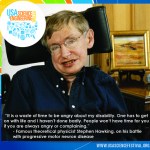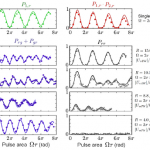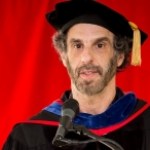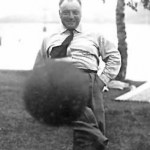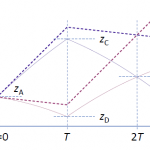Science
I am at a meeting at an undisclosed location, and concurrently the weak lensing folk are having a workshop on future surveys, so I am slumming at their sessions in my copious spare time.
This morning Tony Tyson is leading a discussion on the technical aspects of the surveys, with LSST as the working example.
That is all well and good, and it is actually extremely interesting to hear people talk about the nitty gritty - I think it is good for theorists to hear about what it is really like down in the trenches, as it were.
But, the really interesting aspect is the discussion diverged into…
Having said that I want to focus more on positive stuff, and talking up cool things in science, I'm going to make an effort to do more write-ups of research papers. I've got a few ideas along those lines, and of course I get regular emails from journals and press offices bringing other papers to my attention. But I don't want to neglect my audience, here...
So, I'll throw this open as a place to request discussions of particular topics or papers. If there's some topic in physics that you'd like me to write up an explanation of, or a paper or preprint that you'd like me to do the detailed Q…
One of the great frustrations of my intellectual life, such as it is, is the problem of the disappearing quote. This is a function of having acquired a broad liberal education (in the sense of "liberal arts college" not the sense of "person to the left of Rush Limbaugh") in a somewhat haphazard manner. My knowledge of physics is reasonably systematic, but for just about everything else, I've taken a bunch of classes, and read quite a bit of stuff, but never done all that much to keep the knowledge thus acquired organized. Which frequently leaves me in the position of knowing I read something…
Stephen Hawking: Theoretical Physicist and Bestselling Author
Stephen Hawking is often regarded as one of the most brilliant theoretical physicists since Einstein. He is best known for his compelling insights into such areas as Black Holes, relativity and quantum mechanics.
Since bursting onto the international scene in 1988 with his bestselling book, “A Brief History of Time", Stephen Hawking has become synonymous with helping us understand fundamental mysteries of physics and our existence, such as: Where did the universe come from? How and why did it begin? Will it come to an end, and if…
The day I bought my iPad, as I was taking it out of the box, SteelyKid (then 3) came bopping into my office, spotted it, and declared "I want to play Angry Birds!" It's a remarkable demonstration of the genius of their product: not only have they created a game that a three-year-old can play, they've managed to make every three-year-old in the industrialized world aware of their product.
It's also a testament to my current obsession, the universality of science, and not just because you can use the game to illustrate physics. After all, the process of playing the game serves as a good…
I'm always a little ambivalent about writing up papers that have also been written up in Physics: on the one hand, they make a free PDF of the paper available, which allows me to reproduce figures from the paper in my post, since I'm not breaking a paywall to do it. Which makes it much more attractive to write these up. On the other hand, though, they do a pretty good job writing accessible descriptions, so there's not that much for me to add.
In the case of this paper, I'll write it up anyway (albeit somewhat more briefly than usual, because they already did a nice job), just because the…
Gang, don't try this at home. I'm a trained professional, so I can get away with it, although I do face extreme risk of brain damage.
I am reading two books at once. OK, that part isn't too scary, I'm actually just alternating between the two — an hour with one at lunch time, an hour or two with another before bed. I trust you all are able to do this, no problem.
It's the pairing that is the killer. In one corner, I'm reading the marvelously detailed, juicy, thought-provoking The Cambrian Explosion: The Construction of Animal Biodiversity by the highly regarded scientists, Erwin and Valentine…
Kate had to leave at 7am this morning to go to a "retreat" for her office, so I took the kids to Dunkin' Donuts for breakfast. That got us all out the door at the same time, avoiding the freakout from The Pip if he saw Mommy leave without him. Kate will be late getting home tonight, as well, so I've got dinner with the kids as well, and SteelyKid has already declared that she wants to go to the Irish pub downtown for sweet potato fries and fish & chips.
I mention this not because I want to fill the blog with trivial details of my personal life-- that's what Twitter is for-- but because it…
One of the great things about "Fermi Problems" is that there are multiple ways of attacking them. So, for example, when considering the death ray plot yesterday, I used medical devices as an example system to assess the plausibility of the plot, while Physics Buzz talked total energy. But those aren't the only ways to approach this, and turning it over last night, I thought of another approach.
As I mentioned in yesterday's post, I normally think of light in terms of photon flux or energy flux, and one way to go at this would be to ask how many photons of light you'd be dealing with. The…
One bad thing about SteelyKid's preschool graduation yesterday was that it drained my phone battery, causing me to miss an interview request from a local TV station looking for somebody to talk about a a couple of local guys arrested for a plot to build a "death ray" from X-ray components. This is pretty far from my area of expertise, but, hey, I'd be willing to go on tv and talk about just about anything physics-related. And, as always, I promise to be at least 90% less wrong than Michio Kaku.
Of course, on another level, I'm kind of glad that I didn't get the message in time, because when I…
Earlier this month I got an invitation to the White House.
It was rather cryptic, asking me to attend an Event, today, followed by a reception in the Indian Treaty Room
Regrettably, I had to decline, I was in Europe, and would only just be getting back. The logistics of getting to DC in time were near impossible; there is no source of funding for such jaunts; and, most important, there was no way I could get the paperwork to be cleared to attend submitted in time.
So, they went ahead without me.
Paul Ginsparg
The Event was the Champions of Change - Open Science edition: a Call for…
One of the oddities of writing the book-in-progress is that it involves a lot more history-of-science than I'm used to. which means I'm doing things like checking out 800-page scientific biographies from the college library so I can use them to inform 500 word sections of 4000 word chapters. One of these is Cavendish: The Experimental Life by Christa Jungnickel and Russell McCormmach, a biography of Henry Cavendish (and his father), whose most famous experiment is one of the things I plan to describe in the book. Henry himself turns out to be quite a character, though, thus the 800-page…
Isn't this gorgeous?
Its not new; BA blogged it last year, from Emily Lakdawalla, but I didn't notice. I forget why I noticed now. Its all fluid-dynamicsy of course; and it (or something very similar) can be recreated in the lab. There's another very nice image here.
I think its gorgeous partly because you don't expect hexagons. And note that this isn't the same sort of hexagon that you get from packed convective cells; that's a geometrical thing, and occurs because squishing circles together makes hexagons.
Refs
* I ran to Ely
Don't you hate it when you get up in the morning and the first thing you read on the internet is that the news that your entire career has been a waste of time, your whole field of study has collapsed, and you're going to have to rethink your entire future? Happens to me all the time. But then, I read the creationist news, so I've become desensitized to the whole idea of intellectual catastrophes.
Today's fresh demolition of the whole of evolutionary theory comes via Christian News, which reports on a paper in the journal Molecular Biology and Evolution which challenges the ape to human…
Image of common model organisms from European Molecular Biology Laboratory (EMBL).
A recent article posted in the BBC News provided a good explanation of why scientists commonly study these organisms as models for human diseases and conditions. Model organisms are chosen because their physiology is similar to other animals, including humans, in addition to other reasons:
Visit the BBC News to see why researchers most often use flies, fish, mice and worms to understand the mechanisms of disease and health.
Did you know that ~70% of the genes in a…
I've got a ton of stuff that needs to get done this week, but I don't want the blog to be completely devoid of new content, so here's a quasi-poll question for my wise and worldly readers:
What scientist is most in need of a good popular biography?
By "popular biography," I mean things like Norton's Great Discoveries books, several of which Ive reviewed here, including Krauss on Feynman and Reeves on Rutherford, two books that I keep coming back to for useful tidbits. These aren't deep works of historical scholarship, and don't necessarily attempt to be definitive, but focus on being…
"One of my favorite philosophical tenets is that people will agree with you only if they already agree with you. You do not change people's minds." -Frank Zappa
One of the most difficult things to talk about, for any self-respecting scientist, is politics. Like all of you, I have my preferences, my opinions, and my vision for what a better world would look like. I'm also well aware that if I talked about all of them, there probably wouldn't be a single one of you out there who agreed with everything I had to say.
Image credit: Pablo Martinez Monsivais/AP.
And it would be completely…
I'm shocked. Just totally surprised. And it was unanimous — the Supreme Court determined that human genes cannot be patented. This is excellent news.
Why is it a good decision? Because medical DNA analysis was turning into a patchwork of competing landgrabs. Sequencing technology is coming along so nicely that more and more diagnostic tools are available, that can analyze big chunks of the genome for, for instance, known dangerous mutations. But at the same time, many stretches of DNA were 'owned', or patented by various companies. A company called Myriad had the patents on the genes BRCA1…
I'm pleased the Supreme Court has decided to reject the idea of patenting genes, as such case law would be restrictive to scientific discovery and also just feels fundamentally icky. From a legal perspective, as far as I understand patent law (not a lawyer here), it also seemed to fail on the more basic level of novelty and obviousness. The methods used to discover such genes were not what was invented. And one could conceive of "gene trolls" that would seek out gene aberrations and sit on them, just like other patent trolls, waiting for a payout and hindering scientific and medical…
A few months back, I got a call from a writer at a physics magazine, asking for comments on a controversy within AMO physics. I read a bunch of papers, and really didn't quite understand the problem; not so much the issue at stake, but why it was so heated. When I spoke to the writer (I'm going to avoid naming names as much as possible in this post, for obvious reasons; anyone I spoke to who reads this is welcome to self-identify in the comments), he didn't really get it, either, and after kicking it around for a while, it failed to resolve into a story for either of us-- in his case, because…
